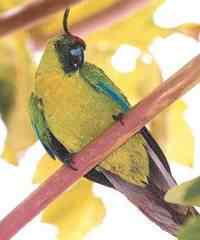非洲的保护区里的生物多样性也在减少
由国际鸟盟等统筹于非洲七国117个保护区的监测结果,发觉生物多样性明显退减。没有研究就不能有结果和了解问题,我们在亚洲也应该有一些有系统的监测工作。
Biodiversity in Africa's Protected Areas declining Fast
12-05-2010
The status of Biodiversity is progressively declining in African Protected Areas according to BirdLife International. This was unveiled during a side event today hosted by BirdLife during the on-going SBSTAA meeting attended by Government delegates from all over the world.
In total, BirdLife is working in 22 countries in Africa in over 1,200 IBAs. While all countries have increased efforts to conserve biodiversity, much more is still to be done. The side event in Nairobi, Kenya, shared results from a monitoring project of Protected Areas at 117 sites, across seven African countries, implemented by BirdLife and RSPB (BirdLife in the UK) and funded by the European Commission.
The monitoring results clearly show that the state of biodiversity in Protected Areas is declining. Sites identified as being in a poor state increased from 43% in 2001, to 57% in 2008.
“The results of our monitoring indicate that the pressures on biodiversity have been increasing” —Dr Muhtari Aminu Kano, BirdLife International’s Global Policy and Advocacy Advisor
At the same time there has been a general increase of threats facing Protected Areas. "The results of our monitoring indicate that the pressures on biodiversity have been increasing, falling far short of the target to reduce biodiversity loss", said Dr Muhtari Aminu Kano - BirdLife International's Global Policy and Advocacy Advisor.
Delegates at the meeting heard how BirdLife used a simple 'State, Pressure, Response' Model for the monitoring of African Important Bird Areas (IBAs), of which 46% are Protected Areas.
The data from the monitoring have been used to develop indicators to show trends over time within IBAs. These results form important components of the suite of indicators suitable to track biodiversity progress towards the 2010 Convention on Biological Diversity (CBD) target, and wider sustainable development around the globe.
"The results also show that if proper management responses are put in place it is possible to improve the state of biodiversity and reduce pressures", said Achilles Byaruhanga - Executive Director of Nature Uganda (BirdLife Partner).
"This was well demonstrated through the sites monitored in Botswana - Central Kalahari Game reserve, Okavango Delta and Mannyelanong - where comprehensive and effective uses of existing management plans have been instituted".
“The results also show that if proper management responses are put in place it is possible to improve the state of biodiversity” —Achilles Byaruhanga, Executive Director of Nature Uganda (BirdLife Partner)
BirdLife told delegates that it is important for policies to be implemented and alternative livelihoods be provided for to reduce the pressures facing Protected Areas to ensure that governments start moving towards meeting their biodiversity target under the CBD.
"BirdLife's monitoring tool is a useful tool and can be used by Governments to identify threats, assess their impacts and that of conservation action while at the same time helping to develop solutions", said Dr Julius Arinaitwe - BirdLife Africa Partnership Director.
"BirdLife supports a post 2010 commitment by Governments (2020 target) that urges for urgent action to halt biodiversity loss; to reduce pressure on biodiversity, prevent extinctions, restore ecosystems while equitably sharing the benefits, thus contributing to human well being and poverty reduction", concluded Dr Arinaitwe.













发表评论:
◎欢迎参与讨论,请在这里发表您的提问或看法,交流您的观点。